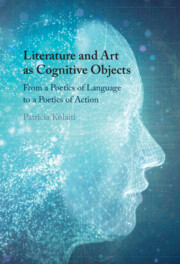Book contents
- Literature and Art as Cognitive Objects
- Literature and Art as Cognitive Objects
- Copyright page
- Contents
- Figures
- Acknowledgements
- Funding
- Additional material
- Introduction
- 1 A Theory of blibs
- 2 What Sort of Concept Literature and Art Is Not
- 3 Literature and Art as an Action
- 4 Literature and Art as a Cognitive and Natural Object
- 5 How to Solve the Ontological Puzzles
- 6 Literature, Art and Relevance
- 7 Ιnterdisciplinary Effects on the Psychology and Neuroscience of Creativity
- Bibliography
- Index
5 - How to Solve the Ontological Puzzles
Published online by Cambridge University Press: 04 September 2025
- Literature and Art as Cognitive Objects
- Literature and Art as Cognitive Objects
- Copyright page
- Contents
- Figures
- Acknowledgements
- Funding
- Additional material
- Introduction
- 1 A Theory of blibs
- 2 What Sort of Concept Literature and Art Is Not
- 3 Literature and Art as an Action
- 4 Literature and Art as a Cognitive and Natural Object
- 5 How to Solve the Ontological Puzzles
- 6 Literature, Art and Relevance
- 7 Ιnterdisciplinary Effects on the Psychology and Neuroscience of Creativity
- Bibliography
- Index
Summary
Chapter 5 builds on the cognitivist account of literature and art introduced in Chapter 4 to provide a fresh approach to some persistent questions in literary theory, literary linguistics and the philosophy of art. It eliminates a number of long-standing taxonomic confusions and sheds light on enduring puzzles such as the problem of ‘indiscernible objects’: what is it that distinguishes a stretch of ordinary discourse and the same stretch of discourse when quoted verbatim in a poetry book as ‘found text’; mere urinals and Duchamp’s Fountain; a genuine artwork and a perceptually indiscernible perfect forgery? Are the moai, the monolithic human figures carved by the Rapa Nui people on Easter Island in eastern Polynesia, artworks? And if a ready-made artwork is accidentally broken, can it just be replaced by another token of the same type, or is the ‘original’ artwork inadvertently lost? The discussion opens entirely new ways of thinking that might help to escape centuries of dead-ends and circularities, while at the same time giving rise to new types of interdisciplinary programmes on the interface of literary and art studies, linguistics and the cognitive sciences.
Information
- Type
- Chapter
- Information
- Literature and Art as Cognitive ObjectsFrom a Poetics of Language to a Poetics of Action, pp. 131 - 144Publisher: Cambridge University PressPrint publication year: 2025
Accessibility standard: WCAG 2.1 AA
Why this information is here
This section outlines the accessibility features of this content - including support for screen readers, full keyboard navigation and high-contrast display options. This may not be relevant for you.Accessibility Information
Content Navigation
Allows you to navigate directly to chapters, sections, or non‐text items through a linked table of contents, reducing the need for extensive scrolling.
Provides an interactive index, letting you go straight to where a term or subject appears in the text without manual searching.
Reading Order & Textual Equivalents
You will encounter all content (including footnotes, captions, etc.) in a clear, sequential flow, making it easier to follow with assistive tools like screen readers.
You get concise descriptions (for images, charts, or media clips), ensuring you do not miss crucial information when visual or audio elements are not accessible.
You get more than just short alt text: you have comprehensive text equivalents, transcripts, captions, or audio descriptions for substantial non‐text content, which is especially helpful for complex visuals or multimedia.
Visual Accessibility
You will still understand key ideas or prompts without relying solely on colour, which is especially helpful if you have colour vision deficiencies.
Structural and Technical Features
You gain clarity from ARIA (Accessible Rich Internet Applications) roles and attributes, as they help assistive technologies interpret how each part of the content functions.
